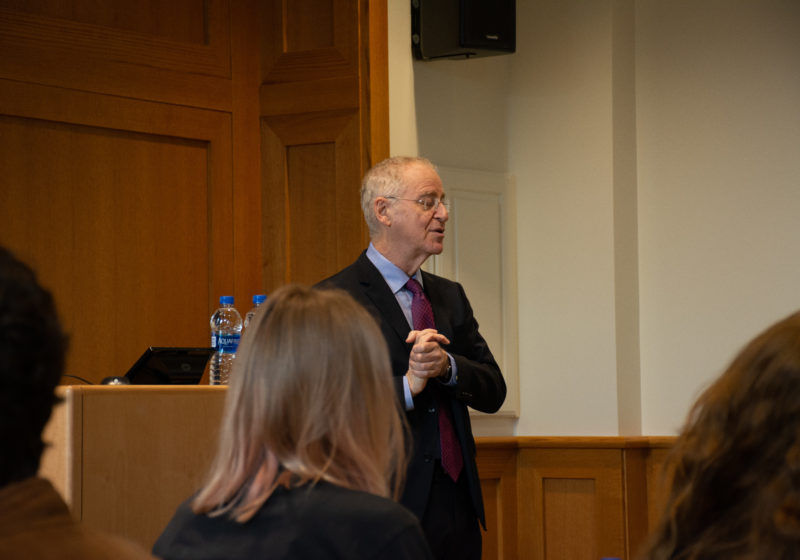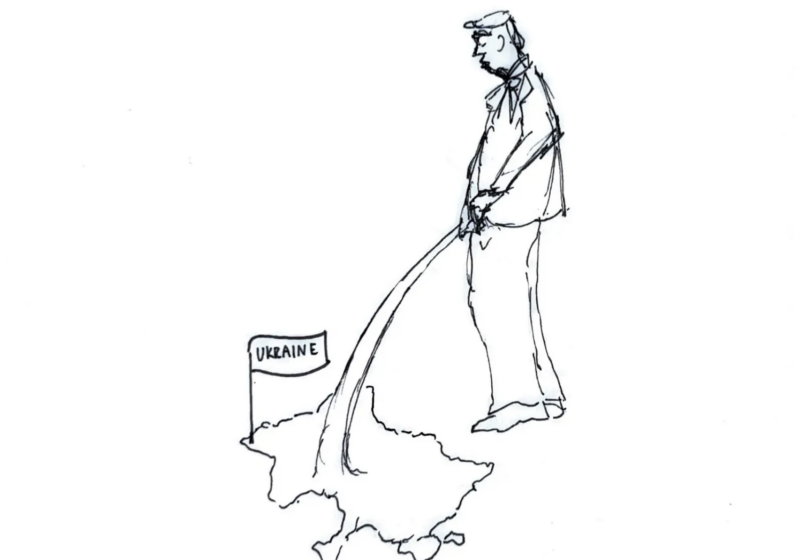Pulitzer-winning biographer Ron Chernow imparted historical perspective and life advice this past Mel Weekend, painting an unconventional but compelling portrait of Ulysses S. Grant along the way.
Chernow is known for works on George Washington and Alexander Hamilton — the latter inspiring Lin-Manuel Miranda’s smash-hit musical, on which Chernow served as historical consultant. He visited UR on Friday, participating in a student discussion and a University symposium.
Roughly 20 students — some of whom were nominated to attend as history fellows — came with prepared questions to the student discussion with Chernow in the Humanities Center in Rush Rhees. Some visiting alumni also attended.
Chernow, whose most recent biography, “Grant,” follows the life of the 18th president, began the discussion with some words of his own, talking about his own experience graduating college.
“As you approach graduation you all have a blueprint or vision of your future in mind,” said Chernow. “It will have little or no resemblance to where you are today.”
Chernow, who began his career with dreams of being a novelist, said that the only history course he ever took in college was a in Irish history. (Only because he was interested in the author James Joyce.) Chernow told attendees that he only wrote nonfiction by accident, when an idea for an article he was hoping to sell to a magazine was accepted on the condition that he wrote the article himself. The article got published, beginning Chernow’s nonfiction career.
“I was never interested in nonfiction, but I was smart enough to realize that there was a reaction to my nonfiction that there never was to my fiction.”
At the end of his introductory spiel, Chernow asked all of the students interested in writing to raise their hands, and then asked them which types of writing they were interested in. Chernow praised one student’s interest in translation, and talked about the lessons learned from journalistic writing.
Unsurprisingly, the first question involved Alexander Hamilton — a student asked whether Hamilton had any ambitions that were cut off by his death in the famous duel with Aaron Burr. (Hamilton’s political career was dead at that point, but he was still one of the foremost lawyers, Chernow responded.)
Another student asked about the importance of women in Chernow’s biographies. Chernow spoke particularly about his satisfaction with the way that Hamilton’s wife, Elizabeth Schuyler Hamilton, has come to be seen as a “founding mother,” thanks to Chernow’s biography and Miranda’s musical.
At the University symposium in Goergen, Chernow — after being introduced by University President Richard Feldman — gave a talk, in which he stuck mainly to speaking about Grant’s story, starting from the beginning of his life. He spoke extensively about the failures that marked Grant’s life before his extremely successful career as a general of the Union Army in the Civil War. Grant’s past failures, Chernow said, influenced his respectful treatment of the defeated South at the end of the Civil War.
“Only, I think, a man who had experienced so much failure before the war, could have understood so well the psychology of these defeated men, and respected their desperate need to save face at such a difficult moment.” Chernow said. “He becomes the chief symbol of North-South reconciliation.”
Chernow also emphasized that history has been very selective in its remembrance of Grant.
“The Civil War was only the first act in a two act drama. The second act is reconstruction.”
Chernow said that one of the biggest issues that Grant faced as president was the rise of the Ku Klux Klan, which “killed thousands of newly enfranchised black Americans without prosecution[…].”
“The Klan’s reign is by far the greatest episode of domestic terrorism in American history,” Chernow said. “But once again it has vanished in the black hole of oblivion.”
When Chernow’s talk ended and the Q&A portion began, in which English Professor Joanna Scott served as interviewer, people began trickling out. Chernow spoke about his experience writing and researching.
Towards the end of the interview, Chernow talked about when it was he realized his novelistic aspirations could be satisfied through nonfiction writing. It came after he had been researching various historical figures for his first book, “The House of Morgan.”
“All of these figures I had read about were bustling around in my mind. I couldn’t stop thinking about them. I couldn’t stop wondering about them,” he said. “I remember stopping at a street corner and saying ‘Oh my God. this is what it must feel like to be a true novelist.’”





